
- Bioactive Compounds
- By Signaling Pathways
- PI3K/Akt/mTOR
- Epigenetics
- Methylation
- Immunology & Inflammation
- Protein Tyrosine Kinase
- Angiogenesis
- Apoptosis
- Autophagy
- ER stress & UPR
- JAK/STAT
- MAPK
- Cytoskeletal Signaling
- Cell Cycle
- TGF-beta/Smad
- Compound Libraries
- Popular Compound Libraries
- Customize Library
- Clinical and FDA-approved Related
- Bioactive Compound Libraries
- Inhibitor Related
- Natural Product Related
- Metabolism Related
- Cell Death Related
- By Signaling Pathway
- By Disease
- Anti-infection and Antiviral Related
- Neuronal and Immunology Related
- Fragment and Covalent Related
- FDA-approved Drug Library
- FDA-approved & Passed Phase I Drug Library
- Preclinical/Clinical Compound Library
- Bioactive Compound Library-I
- Bioactive Compound Library-II
- Kinase Inhibitor Library
- Express-Pick Library
- Natural Product Library
- Human Endogenous Metabolite Compound Library
- Alkaloid Compound LibraryNew
- Angiogenesis Related compound Library
- Anti-Aging Compound Library
- Anti-alzheimer Disease Compound Library
- Antibiotics compound Library
- Anti-cancer Compound Library
- Anti-cancer Compound Library-Ⅱ
- Anti-cancer Metabolism Compound Library
- Anti-Cardiovascular Disease Compound Library
- Anti-diabetic Compound Library
- Anti-infection Compound Library
- Antioxidant Compound Library
- Anti-parasitic Compound Library
- Antiviral Compound Library
- Apoptosis Compound Library
- Autophagy Compound Library
- Calcium Channel Blocker LibraryNew
- Cambridge Cancer Compound Library
- Carbohydrate Metabolism Compound LibraryNew
- Cell Cycle compound library
- CNS-Penetrant Compound Library
- Covalent Inhibitor Library
- Cytokine Inhibitor LibraryNew
- Cytoskeletal Signaling Pathway Compound Library
- DNA Damage/DNA Repair compound Library
- Drug-like Compound Library
- Endoplasmic Reticulum Stress Compound Library
- Epigenetics Compound Library
- Exosome Secretion Related Compound LibraryNew
- FDA-approved Anticancer Drug LibraryNew
- Ferroptosis Compound Library
- Flavonoid Compound Library
- Fragment Library
- Glutamine Metabolism Compound Library
- Glycolysis Compound Library
- GPCR Compound Library
- Gut Microbial Metabolite Library
- HIF-1 Signaling Pathway Compound Library
- Highly Selective Inhibitor Library
- Histone modification compound library
- HTS Library for Drug Discovery
- Human Hormone Related Compound LibraryNew
- Human Transcription Factor Compound LibraryNew
- Immunology/Inflammation Compound Library
- Inhibitor Library
- Ion Channel Ligand Library
- JAK/STAT compound library
- Lipid Metabolism Compound LibraryNew
- Macrocyclic Compound Library
- MAPK Inhibitor Library
- Medicine Food Homology Compound Library
- Metabolism Compound Library
- Methylation Compound Library
- Mouse Metabolite Compound LibraryNew
- Natural Organic Compound Library
- Neuronal Signaling Compound Library
- NF-κB Signaling Compound Library
- Nucleoside Analogue Library
- Obesity Compound Library
- Oxidative Stress Compound LibraryNew
- Plant Extract Library
- Phenotypic Screening Library
- PI3K/Akt Inhibitor Library
- Protease Inhibitor Library
- Protein-protein Interaction Inhibitor Library
- Pyroptosis Compound Library
- Small Molecule Immuno-Oncology Compound Library
- Mitochondria-Targeted Compound LibraryNew
- Stem Cell Differentiation Compound LibraryNew
- Stem Cell Signaling Compound Library
- Natural Phenol Compound LibraryNew
- Natural Terpenoid Compound LibraryNew
- TGF-beta/Smad compound library
- Traditional Chinese Medicine Library
- Tyrosine Kinase Inhibitor Library
- Ubiquitination Compound Library
-
Cherry Picking
You can personalize your library with chemicals from within Selleck's inventory. Build the right library for your research endeavors by choosing from compounds in all of our available libraries.
Please contact us at [email protected] to customize your library.
You could select:
- Antibodies
- Bioreagents
- qPCR
- 2x SYBR Green qPCR Master Mix
- 2x SYBR Green qPCR Master Mix(Low ROX)
- 2x SYBR Green qPCR Master Mix(High ROX)
- Protein Assay
- Protein A/G Magnetic Beads for IP
- Anti-DYKDDDDK Tag magnetic beads
- Anti-DYKDDDDK Tag Affinity Gel
- Anti-Myc magnetic beads
- Anti-HA magnetic beads
- Poly DYKDDDDK Tag Peptide lyophilized powder
- Protease Inhibitor Cocktail
- Protease Inhibitor Cocktail (EDTA-Free, 100X in DMSO)
- Phosphatase Inhibitor Cocktail (2 Tubes, 100X)
- Cell Biology
- Cell Counting Kit-8 (CCK-8)
- Animal Experiment
- Mouse Direct PCR Kit (For Genotyping)
- New Products
- Contact Us
PPAR
PPAR Products
- All (60)
- PPAR Inhibitors (9)
- PPAR Activators (13)
- PPAR Antagonists (5)
- PPAR Agonists (28)
- PPAR Modulators (5)
- New PPAR Products
| Catalog No. | Product Name | Information | Product Use Citations | Product Validations |
|---|---|---|---|---|
| S2871 | T0070907 | T0070907 is a potent inhibitor of PPARγ (peroxisome proliferator activator receptor γ ) that induces G2/M arrest and enhances the effect of radiation in human cervical cancer cells through mitotic catastrophe. It also acts as an antagonist of PPARγ that suppresses breast cancer cell proliferation and motility via both PPARgamma-dependent and -independent mechanisms. |
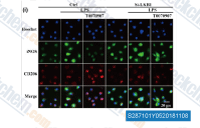
|
|
| S2556 | Rosiglitazone | Rosiglitazone is a potent antihyperglycemic agent and a potent thiazolidinedione insulin sensitizer with IC50 of 12, 4 and 9 nM for rat, 3T3-L1 and human adipocytes, respectively. Rosiglitazone is a pure ligand of PPAR-gamma, and has no PPAR-alpha-binding action. Rosiglitazone modulates TRP channels and induces autophagy. Rosiglitazone prevents ferroptosis. |
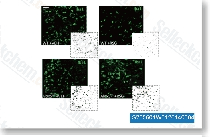
|
|
| S2915 | GW9662 | GW9662 is a selective PPAR antagonist for PPARγ with IC50 of 3.3 nM in a cell-free assay, with at least 10- to 600-fold functional selectivity in cells with PPARγ versus PPARα and PPARδ. |
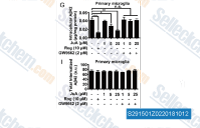
|
|
| S2590 | Pioglitazone | Pioglitazone is a selective peroxisome proliferator-activated receptor-gamma (PPARγ) agonist, used to treat diabetes; A weak activator for full-length hPPARα, but not full-length hPPARδ. |
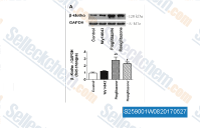
|
|
| S2505 | Rosiglitazone maleate | Rosiglitazone maleate, a member of the thiazolidinedione class of antihyperglycaemic agents, is a high-affinity selective agonist of the peroxisome proliferator-activated receptor-γ (PPAR-γ) with IC50 of 42 nM. Rosiglitazone maleate also modulates TRP channels and induces autophagy. Rosiglitazone prevents ferroptosis. |
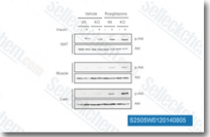
|
|
| S7484 | FH535 | FH535 is a Wnt/β-catenin signaling inhibitor and also a dual PPARγ and PPARδ antagonist. |
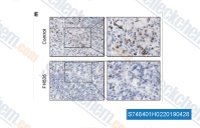
|
|
| S2075 | Rosiglitazone HCl | Rosiglitazone HCl is a blood glucose-lowering drugs, stimulating insulin secretion by binding to the PPAR receptors in fat cells. |
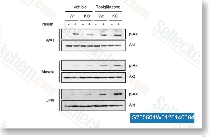
|
|
| S8029 | WY-14643 (Pirinixic Acid) | WY-14643 (Pirinixic Acid, NSC 310038) is a potent and selective PPARα activator with an EC50 of 1.5 μM. |
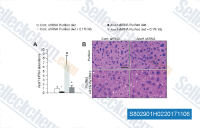
|
|
| S2798 | GW6471 | GW 6471 is a potent antagonist of PPARα with IC50 of 0.24 μM. | ||
| S1794 | Fenofibrate | Fenofibrate is a compound of the fibrate class and fibric acid derivative. Fenofibrate is a selective agonist of PPARα with EC50 of 30 μM. Fenofibrate binds to and inhibits cytochrome P450 epoxygenase (CYP)2C with IC50 of 0.2 μM, 0.7 μM and 9.7 μM for CYP2C19, CYP2B6 and CYP2C9, respectively. Fenofibrate induces autophagy. |
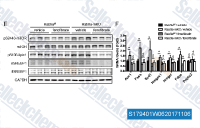
|
|
| S8025 | GSK3787 | GSK3787 is a selective and irreversible antagonist of PPARδ with pIC50 of 6.6, with no measurable affinity for hPPARα or hPPARγ. |
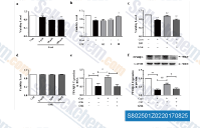
|
|
| S2046 | Pioglitazone HCl | Pioglitazone HCl (AD-4833, U-72107E) is an inhibitor of cytochrome P450 (CYP)2C8 and CYP3A4 enzymes. Pioglitazone HCl inhibits CYP2C8, CYP3A4 and CYP2C9 with Ki of 1.7 μM, 11.8 μM and 32.1 μM, respectively. Pioglitazone HCl is also a selective peroxisome proliferator-activated receptor-gamma (PPARγ) agonist with EC50 of 0.93 μM and 0.99 μM for human PPARγ and mouse PPARγ, respectively. Pioglitazone HCl inhibits mitochondrial iron uptake, lipid peroxidation, and subsequent ferroptosis. |
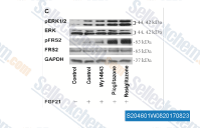
|
|
| S8020 | GW0742 | GW0742 is a potent and highly selective PPARβ/δ agonist, with IC50 of 1 nM, with 1000-fold selectivity over hPPARα and hPPARγ. |
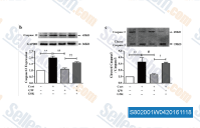
|
|
| S7955 | EPI-001 | EPI-001 is an androgen receptor N-terminal domain antagonist with IC50 of ∼6 μM and a selective PPAR-gamma modulator. | ||
| S7767 | AZ6102 | AZ6102 is a potent TNKS1/2 inhibitor that has 100-fold selectivity against other PARP family enzymes and shows IC50 of 5 nM for Wnt pathway inhibition in DLD-1 cells. | ||
| S3834 | Astaxanthin | Astaxanthin (β-Carotene-4,4'-dione, Trans-Astaxanthin), a xanthophyll carotenoid, is a nutrient with unique cell membrane actions and diverse clinical benefits with excellent safety and tolerability. Astaxanthin, a red dietary carotenoid isolated from Haematococcus pluvialis, is a modulator of PPARγ and a potent antioxidant with antiproliferative, neuroprotective and anti-inflammatory activity. | ||
| S3846 | Eupatilin | Eupatilin (NSC 122413), a major flavonoid from Artemisia plants, possesses various beneficial biological effects including anti-inflammation, anti-tumor, anti-cancer, anti-allergy, and anti-oxidation activity. Eupatilin, a lipophilic flavonoid isolated from Artemisia species, is a PPARα agonist, and possesses anti-apoptotic, anti-oxidative and anti-inflammatory activities. | ||
| S8432 | Troglitazone | Troglitazone is a potent agonist for the peroxisome proliferator-activated receptor-(PPAR) that is a ligand activated transcription factor regulating cell differentiation and growth. Troglitazone induces autophagy, apoptosis and necroptosis in bladder cancer cells. Troglitazone prevents RSL3-induced ferroptosis and lipid peroxidation in Pfa1 cells. | ||
| S5817 | GSK0660 | GSK0660 is a potent PPARβ/δ antagonist with a pIC50 of 6.8 (binding assay IC50 = 155 nM; antagonist assay IC50 = 300 nM) and is nearly inactive on PPARα and PPARγ with IC50s above approximately 10 μM. | ||
| S4159 | Bezafibrate | Bezafibrate (BM 15075) is the first clinically tested dual and pan-PPAR co-agonism. | ||
| S9189 | Oroxin A | Oroxin A (Baicalein 7-O-glucoside), an active component isolated from the herb Oroxylum indicum (L.) Kurz, activates PPARγ and inhibits α-glucosidase, exerting antioxidant activity. | ||
| S9723 | CDDO-Im (RTA-403) | CDDO-Im (RTA-403) is an activator of nuclear factor erythroid 2–related factor 2 (Nrf2) and peroxisome proliferator-activated receptor (PPAR). CDDO-Im binds to PPARα and PPARγ with Ki of 232 nM and 344 nM, respectively. CDDO-Im inhibits inflammatory response and tumor growth in vivo. | ||
| S4527 | Fenofibric acid | Fenofibric acid (NSC 281318, Trilipix, FNF acid) is a fibrate that acts as a lipid-lowering agent, decreasing low-density lipoprotein cholesterol and triglycerides. | ||
| S3868 | Harmine | Harmine (Telepathine), a fluorescent harmala alkaloid belonging to the beta-carboline family of compounds, is a highly cell-permeant and competitive inhibitor of ATP binding to the kinase pocket of DYRK1A, with about 60-fold higher IC50 value for DYRK2. Harmine also inhibits monoamine oxidases (MAOs), PPARγ and cdc-like kinases (CLKs). Harmine inhibits 5-HT2A serotonin receptor with Ki of 397 nM. | ||
| S4708 | Palmitoylethanolamide | Palmitoylethanolamide (PEA, Palmidrol, N-palmitoylethanolamine) is an endogenous fatty acid amide and selectively activates PPAR-α in vitro with an EC50 value of 3.1±0.4 μM. | ||
| S2665 | Ciprofibrate | Ciprofibrate (Win-35833) is a peroxisome proliferator-activated receptor agonist. | ||
| S1849 | Daidzein | Daidzein is a natural isoflavone phytoestrogen found in Leguminosae, used as a component of foods and dietary supplements. Daidzein is a soy isoflavone, which acts as a PPAR activator. | ||
| S4207 | Clofibric Acid | Clofibric acid(Chlorofibrinic acid) is a PPARα agonist and hypolipidemic agent. | ||
| S8770 | Lanifibranor (IVA-337) | Lanifibranor (IVA-337) is a moderately potent and well balanced pan PPAR agonist with EC50 values of 1537 nM, 866 nM and 206 nM for hPPARα, hPPARδ and hPPARγ, respectively. | ||
| S0531 | DG172 dihydrochloride | DG-172 dihydrochloride is a novel PPARβ/δ-selective antagonist with the IC50 of 27 nM. | ||
| S6906 | Capric acid | Capric acid (DA, Decanoic acid, Decylic acid), a component of medium-chain triclycerides occurring naturally in coconut oil and palm kernel oil, contributes to seizure control through direct AMPA receptor inhibition. Capric acid is also a modulating ligand for PPARs. Due to its specific melting range the product may be solid, liquid, a solidified melt or a supercooled melt. | ||
| S3786 | Glabridin | Glabridin (Q-100692, KB-289522, LS-176045), one of the active phytochemicals in licorice extract, binds to and activates the ligand binding domain of PPARγ, as well as the full length receptor. It is also a GABAA receptor positive modulator promoting fatty acid oxidation and improving learning and memory. | ||
| S3875 | Alpinetin | Alpinetin, a composition of Alpinia katsumadai Hayata, has been reported to have a number of biological properties, such as antibacterial, antitumor and other important therapeutic activities. Alpinetin is a flavonoid isolated from Alpinia katsumadai Hayata, activates activates PPAR-γ, with potent anti-inflammatory activity. | ||
| S3720 | Elafibranor | Elafibranor (GFT505) is an agonist of the peroxisome proliferator-activated receptor-α(PPAR-alpha) and peroxisome proliferator-activated receptor-δ(PPAR-δ). It improves insulin sensitivity, glucose homeostasis, and lipid metabolism and reduces inflammation. | ||
| S7867 | Oleuropein | Oleuropein is an antioxidant polyphenol isolated from olive leaf. Oleuropein exerts antioxidant, anti-inflammatory and anti-atherogenic effects and suppresses the adipocyte differentiation in vitro. Oleuropein inhibits PPARγ activity. Oleuropein exerts anti-adipogenic effect through direct inhibition of PPARγ transcriptional activity. Oleuropein also inhibits aromatase. Oleuropein induces apoptosis. Phase 2. | ||
| S9177 | Gypenoside XLIX | Gypenoside XLIX, a naturally occurring gynosaponin, is a selective peroxisome proliferator-activated receptor (PPAR)-alpha activator. | ||
| S1473New | GW501516 | GW501516 is a potent and highly selective PPARβ/δ agonist, with EC50 of 1 nM, with 1000-fold selectivity over hPPARα and hPPARγ. Phase 4. | ||
| S1729 | Gemfibrozil | Gemfibrozil (CI-719) is an activator of peroxisome proliferator-activated receptor-alpha (PPARα), used for the treatment of hypercholesterolemia and hypertriglyceridemia. | ||
| S9199 | Pseudoginsenoside F11 | Pseudoginsenoside F11, a natural product found in American ginseng but not in Asian ginseng, is a novel partial PPARγ agonist. | ||
| S3290 | Procyanidin B2 (PCB2) | Procyanidin B2 (PCB2), a natural flavonoid found in commonly consumed foods, possess anti-inflammatory, anti-oxidant and anti-cancer activities. Procyanidin B2 activates PPARγ to induce M2 polarization in mouse macrophages. Procyanidin B2 significantly suppresses the activation of NLRP3 inflammasome in the lung tissue induced by paraquat in the rat model. | ||
| E0473 | CUDA | CUDA is a potent inhibitor of soluble epoxide hydrolase (sEH), with IC50s of 11.1 nM and 112 nM for mouse sEH and human sEH, respectively, also selectively increases peroxisome proliferator-activated receptor (PPAR) alpha activity. | ||
| S5121 | Phytol | Phytol (Trans-Phytol), a diterpene alcohol from chlorophyll widely used as a food additive and in medicinal fields, shows antinociceptive and antioxidant activities as well as anti-inflammatory and antiallergic effects. It is a specific activator of PPARα. | ||
| S0773 | Mifobate | Mifobate (SR-202), a potent and specific PPARγ antagonist, selectively inhibits Thiazolidinedione (TZD)-induced PPARγ transcriptional activity (IC50=140 μM). | ||
| E2876 | pemafibrate | Pemafibrate(K-877) is a selective agonist of peroxisome proliferator-activated receptor (PPAR) α with an IC50 of 10 µM. | ||
| E3521 | Auricledleaf Swallowwort Root Extract | Auricledleaf Swallowwort Root Extract is obtained from Cynanchum otophyllum Schneid., which may be mediated by activation of PPARα and TFEB, and the subsequent autophagy-lysosomal pathway enhancement, thus attenuate Alzheimer’s disease pathology and improve cognitive function in 3XTg mice. | ||
| S8046 | GW7647 | GW7647 is a potent PPARα agonist, with EC50s of 6 nM, 1.1 μM, and 6.2 μM for human PPARα, PPARγ and PPARδ, respectively. | ||
| S6635 | Seladelpar | Seladelpar(MBX-8025) is a potent and selective agonist of peroxisome proliferator–activated receptor-delta (PPAR-δ) with EC50 of 2 nM for human PPAR-δ. MBX-8025 enhances insulin sensitivity, counters dyslipidemia, and reduces hepatic storage of lipotoxic lipids, thereby ameliorating NASH pathology in obese diabetic mice. | ||
| S5824 | Cinnamyl alcohol | Cinnamyl alcohol is a naturally occurring compound that is found within cinnamon. Cinnamyl alcohol can be significantly attenuated the enhanced expression of obesity-related proteins PPARγ in MDI medium-cultivated 3T3-L1 cells. | ||
| S5113 | Propyl gallate | Propyl gallate (Gallic acid propyl esterZ, n-Propyl gallate) is an antioxidant used in foods especially animal fats and vegetable oils, also in a wide variety of cosmetics and beauty care products. | ||
| S3878 | Bavachinin | Bavachinin (7-O-Methylbavachin) is a novel natural pan-PPAR agonist from the fruit of the traditional Chinese glucose-lowering herb malaytea scurfpea. It shows stronger activities with PPAR-γ than with PPAR-α and PPAR-β/δ (EC50 = 0.74 μmol/l, 4.00 μmol/l and 8.07 μmol/l in 293T cells, respectively). | ||
| S0170 | BMS-687453 | BMS-687453 (compound 2) is a potent and selective agonist of PPARα with EC50 of 10 nM and IC50 of 260 nM for human PPARα. | ||
| S5812 | Choline Fenofibrate | Choline fenofibrate(ABT-335) is a newly developed choline salt of fenofibric acid, a synthetic phenoxy-isobutyric acid derivate with antihyperlipidemic activity that acts as an PPARα agonist. | ||
| S9674 | Saroglitazar | Saroglitazar (Lipaglyn, ZYH1) is an agonist of peroxisome proliferator-activated receptor (PPAR) with EC50 of 0.65 pM and 3 nM for hPPARα and hPPARγ in HepG2 cells, respectively. | ||
| E1699New | SR10221 | SR10221 is a inverse-agonist of PPARγ with IC50 of 1.6 nM in RT112/84 FABP4-NLucP reporter assay. It exhibits an antiproliferative activity in vitro. | ||
| E1695New | 9-cis-Retinoic acid | 9-cis-Retinoic acid (Alitretinoin, ALRT 1057) is an active metabolite of vitamin A that functions as a high-affinity ligand for retinoid X receptors (RXRs) and also activates retinoic acid receptors (RARs). It inhibits adipogenesis by activating RXR while simultaneously decreasing RXRα and PPARγ levels in an RXR activation-independent manner. | ||
| S9129 | 20(S)-Ginsenoside Rh1 | 20(S)-Ginsenoside Rh1 (Prosapogenin A2, Sanchinoside B2, Sanchinoside Rh1) is one of major bioactive compounds extracted from red ginseng, which has been increasingly used for enhancing cognition and physical health worldwide. It exhibits potent characteristics of anti-inflammatory, antioxidant, immunomodulatory effects, and positive effects on the nervous system. Ginsenoside Rh1 inhibits the expression of PPAR-γ, TNF-α, IL-6, and IL-1β. | ||
| S9480 | Raspberry Ketone | Raspberry ketone (p-Hydroxybenzyl acetone, Frambinone, Oxyphenylon, Rheosmin, Rasketone) is a natural phenolic compound that is the primary aroma compound of red raspberries. Raspberry ketone shows cardioprotective action against isoproterenol-induced myocardial infarction in rats, and the effects may be due to its PPAR-α agonistic activity. | ||
| S5851 | 4'-Methoxychalcone | 4'-Methoxychalcone, found in citrus, is chalcone derivative that has shown diverse pharmacological properties, including anti-tumor and anti-inflammatory activities. 4'-Methoxychalcone significantly enhanced adipocyte differentiation, in part, by its potent effects on PPARγ activation and by its reverse effect on TNF-α. | ||
| E1775 | 2,4-Thiazolidinedione | 2,4-Thiazolidinedione (Thiazolidinedione), an insulin sensitizer, is a specific agonist of peroxisome proliferator-activated receptor (PPAR)γ. Thiazolidinedione treatment corrects impaired muscle insulin action in vivo. | ||
| E1831New | FX-909 | FX-909 is an orally available inverse agonist and inhibitor of the transcription factor (TF) peroxisome proliferator activated receptor gamma (PPARG, PPARγ) ), which exhibits anti-tumor activity in vivo. | ||
| S2871 | T0070907 | T0070907 is a potent inhibitor of PPARγ (peroxisome proliferator activator receptor γ ) that induces G2/M arrest and enhances the effect of radiation in human cervical cancer cells through mitotic catastrophe. It also acts as an antagonist of PPARγ that suppresses breast cancer cell proliferation and motility via both PPARgamma-dependent and -independent mechanisms. |

|
|
| S7484 | FH535 | FH535 is a Wnt/β-catenin signaling inhibitor and also a dual PPARγ and PPARδ antagonist. |

|
|
| S2798 | GW6471 | GW 6471 is a potent antagonist of PPARα with IC50 of 0.24 μM. | ||
| S7767 | AZ6102 | AZ6102 is a potent TNKS1/2 inhibitor that has 100-fold selectivity against other PARP family enzymes and shows IC50 of 5 nM for Wnt pathway inhibition in DLD-1 cells. | ||
| S4527 | Fenofibric acid | Fenofibric acid (NSC 281318, Trilipix, FNF acid) is a fibrate that acts as a lipid-lowering agent, decreasing low-density lipoprotein cholesterol and triglycerides. | ||
| S7867 | Oleuropein | Oleuropein is an antioxidant polyphenol isolated from olive leaf. Oleuropein exerts antioxidant, anti-inflammatory and anti-atherogenic effects and suppresses the adipocyte differentiation in vitro. Oleuropein inhibits PPARγ activity. Oleuropein exerts anti-adipogenic effect through direct inhibition of PPARγ transcriptional activity. Oleuropein also inhibits aromatase. Oleuropein induces apoptosis. Phase 2. | ||
| S5824 | Cinnamyl alcohol | Cinnamyl alcohol is a naturally occurring compound that is found within cinnamon. Cinnamyl alcohol can be significantly attenuated the enhanced expression of obesity-related proteins PPARγ in MDI medium-cultivated 3T3-L1 cells. | ||
| S5113 | Propyl gallate | Propyl gallate (Gallic acid propyl esterZ, n-Propyl gallate) is an antioxidant used in foods especially animal fats and vegetable oils, also in a wide variety of cosmetics and beauty care products. | ||
| S9129 | 20(S)-Ginsenoside Rh1 | 20(S)-Ginsenoside Rh1 (Prosapogenin A2, Sanchinoside B2, Sanchinoside Rh1) is one of major bioactive compounds extracted from red ginseng, which has been increasingly used for enhancing cognition and physical health worldwide. It exhibits potent characteristics of anti-inflammatory, antioxidant, immunomodulatory effects, and positive effects on the nervous system. Ginsenoside Rh1 inhibits the expression of PPAR-γ, TNF-α, IL-6, and IL-1β. | ||
| S8029 | WY-14643 (Pirinixic Acid) | WY-14643 (Pirinixic Acid, NSC 310038) is a potent and selective PPARα activator with an EC50 of 1.5 μM. |

|
|
| S9189 | Oroxin A | Oroxin A (Baicalein 7-O-glucoside), an active component isolated from the herb Oroxylum indicum (L.) Kurz, activates PPARγ and inhibits α-glucosidase, exerting antioxidant activity. | ||
| S9723 | CDDO-Im (RTA-403) | CDDO-Im (RTA-403) is an activator of nuclear factor erythroid 2–related factor 2 (Nrf2) and peroxisome proliferator-activated receptor (PPAR). CDDO-Im binds to PPARα and PPARγ with Ki of 232 nM and 344 nM, respectively. CDDO-Im inhibits inflammatory response and tumor growth in vivo. | ||
| S4708 | Palmitoylethanolamide | Palmitoylethanolamide (PEA, Palmidrol, N-palmitoylethanolamine) is an endogenous fatty acid amide and selectively activates PPAR-α in vitro with an EC50 value of 3.1±0.4 μM. | ||
| S1849 | Daidzein | Daidzein is a natural isoflavone phytoestrogen found in Leguminosae, used as a component of foods and dietary supplements. Daidzein is a soy isoflavone, which acts as a PPAR activator. | ||
| S3875 | Alpinetin | Alpinetin, a composition of Alpinia katsumadai Hayata, has been reported to have a number of biological properties, such as antibacterial, antitumor and other important therapeutic activities. Alpinetin is a flavonoid isolated from Alpinia katsumadai Hayata, activates activates PPAR-γ, with potent anti-inflammatory activity. | ||
| S9177 | Gypenoside XLIX | Gypenoside XLIX, a naturally occurring gynosaponin, is a selective peroxisome proliferator-activated receptor (PPAR)-alpha activator. | ||
| S1729 | Gemfibrozil | Gemfibrozil (CI-719) is an activator of peroxisome proliferator-activated receptor-alpha (PPARα), used for the treatment of hypercholesterolemia and hypertriglyceridemia. | ||
| S3290 | Procyanidin B2 (PCB2) | Procyanidin B2 (PCB2), a natural flavonoid found in commonly consumed foods, possess anti-inflammatory, anti-oxidant and anti-cancer activities. Procyanidin B2 activates PPARγ to induce M2 polarization in mouse macrophages. Procyanidin B2 significantly suppresses the activation of NLRP3 inflammasome in the lung tissue induced by paraquat in the rat model. | ||
| E0473 | CUDA | CUDA is a potent inhibitor of soluble epoxide hydrolase (sEH), with IC50s of 11.1 nM and 112 nM for mouse sEH and human sEH, respectively, also selectively increases peroxisome proliferator-activated receptor (PPAR) alpha activity. | ||
| S5121 | Phytol | Phytol (Trans-Phytol), a diterpene alcohol from chlorophyll widely used as a food additive and in medicinal fields, shows antinociceptive and antioxidant activities as well as anti-inflammatory and antiallergic effects. It is a specific activator of PPARα. | ||
| E3521 | Auricledleaf Swallowwort Root Extract | Auricledleaf Swallowwort Root Extract is obtained from Cynanchum otophyllum Schneid., which may be mediated by activation of PPARα and TFEB, and the subsequent autophagy-lysosomal pathway enhancement, thus attenuate Alzheimer’s disease pathology and improve cognitive function in 3XTg mice. | ||
| S5851 | 4'-Methoxychalcone | 4'-Methoxychalcone, found in citrus, is chalcone derivative that has shown diverse pharmacological properties, including anti-tumor and anti-inflammatory activities. 4'-Methoxychalcone significantly enhanced adipocyte differentiation, in part, by its potent effects on PPARγ activation and by its reverse effect on TNF-α. | ||
| S2915 | GW9662 | GW9662 is a selective PPAR antagonist for PPARγ with IC50 of 3.3 nM in a cell-free assay, with at least 10- to 600-fold functional selectivity in cells with PPARγ versus PPARα and PPARδ. |

|
|
| S8025 | GSK3787 | GSK3787 is a selective and irreversible antagonist of PPARδ with pIC50 of 6.6, with no measurable affinity for hPPARα or hPPARγ. |

|
|
| S5817 | GSK0660 | GSK0660 is a potent PPARβ/δ antagonist with a pIC50 of 6.8 (binding assay IC50 = 155 nM; antagonist assay IC50 = 300 nM) and is nearly inactive on PPARα and PPARγ with IC50s above approximately 10 μM. | ||
| S0531 | DG172 dihydrochloride | DG-172 dihydrochloride is a novel PPARβ/δ-selective antagonist with the IC50 of 27 nM. | ||
| S0773 | Mifobate | Mifobate (SR-202), a potent and specific PPARγ antagonist, selectively inhibits Thiazolidinedione (TZD)-induced PPARγ transcriptional activity (IC50=140 μM). | ||
| S2556 | Rosiglitazone | Rosiglitazone is a potent antihyperglycemic agent and a potent thiazolidinedione insulin sensitizer with IC50 of 12, 4 and 9 nM for rat, 3T3-L1 and human adipocytes, respectively. Rosiglitazone is a pure ligand of PPAR-gamma, and has no PPAR-alpha-binding action. Rosiglitazone modulates TRP channels and induces autophagy. Rosiglitazone prevents ferroptosis. |

|
|
| S2590 | Pioglitazone | Pioglitazone is a selective peroxisome proliferator-activated receptor-gamma (PPARγ) agonist, used to treat diabetes; A weak activator for full-length hPPARα, but not full-length hPPARδ. |

|
|
| S2505 | Rosiglitazone maleate | Rosiglitazone maleate, a member of the thiazolidinedione class of antihyperglycaemic agents, is a high-affinity selective agonist of the peroxisome proliferator-activated receptor-γ (PPAR-γ) with IC50 of 42 nM. Rosiglitazone maleate also modulates TRP channels and induces autophagy. Rosiglitazone prevents ferroptosis. |

|
|
| S2075 | Rosiglitazone HCl | Rosiglitazone HCl is a blood glucose-lowering drugs, stimulating insulin secretion by binding to the PPAR receptors in fat cells. |

|
|
| S1794 | Fenofibrate | Fenofibrate is a compound of the fibrate class and fibric acid derivative. Fenofibrate is a selective agonist of PPARα with EC50 of 30 μM. Fenofibrate binds to and inhibits cytochrome P450 epoxygenase (CYP)2C with IC50 of 0.2 μM, 0.7 μM and 9.7 μM for CYP2C19, CYP2B6 and CYP2C9, respectively. Fenofibrate induces autophagy. |

|
|
| S2046 | Pioglitazone HCl | Pioglitazone HCl (AD-4833, U-72107E) is an inhibitor of cytochrome P450 (CYP)2C8 and CYP3A4 enzymes. Pioglitazone HCl inhibits CYP2C8, CYP3A4 and CYP2C9 with Ki of 1.7 μM, 11.8 μM and 32.1 μM, respectively. Pioglitazone HCl is also a selective peroxisome proliferator-activated receptor-gamma (PPARγ) agonist with EC50 of 0.93 μM and 0.99 μM for human PPARγ and mouse PPARγ, respectively. Pioglitazone HCl inhibits mitochondrial iron uptake, lipid peroxidation, and subsequent ferroptosis. |

|
|
| S8020 | GW0742 | GW0742 is a potent and highly selective PPARβ/δ agonist, with IC50 of 1 nM, with 1000-fold selectivity over hPPARα and hPPARγ. |

|
|
| S3846 | Eupatilin | Eupatilin (NSC 122413), a major flavonoid from Artemisia plants, possesses various beneficial biological effects including anti-inflammation, anti-tumor, anti-cancer, anti-allergy, and anti-oxidation activity. Eupatilin, a lipophilic flavonoid isolated from Artemisia species, is a PPARα agonist, and possesses anti-apoptotic, anti-oxidative and anti-inflammatory activities. | ||
| S8432 | Troglitazone | Troglitazone is a potent agonist for the peroxisome proliferator-activated receptor-(PPAR) that is a ligand activated transcription factor regulating cell differentiation and growth. Troglitazone induces autophagy, apoptosis and necroptosis in bladder cancer cells. Troglitazone prevents RSL3-induced ferroptosis and lipid peroxidation in Pfa1 cells. | ||
| S4159 | Bezafibrate | Bezafibrate (BM 15075) is the first clinically tested dual and pan-PPAR co-agonism. | ||
| S2665 | Ciprofibrate | Ciprofibrate (Win-35833) is a peroxisome proliferator-activated receptor agonist. | ||
| S4207 | Clofibric Acid | Clofibric acid(Chlorofibrinic acid) is a PPARα agonist and hypolipidemic agent. | ||
| S8770 | Lanifibranor (IVA-337) | Lanifibranor (IVA-337) is a moderately potent and well balanced pan PPAR agonist with EC50 values of 1537 nM, 866 nM and 206 nM for hPPARα, hPPARδ and hPPARγ, respectively. | ||
| S3786 | Glabridin | Glabridin (Q-100692, KB-289522, LS-176045), one of the active phytochemicals in licorice extract, binds to and activates the ligand binding domain of PPARγ, as well as the full length receptor. It is also a GABAA receptor positive modulator promoting fatty acid oxidation and improving learning and memory. | ||
| S3720 | Elafibranor | Elafibranor (GFT505) is an agonist of the peroxisome proliferator-activated receptor-α(PPAR-alpha) and peroxisome proliferator-activated receptor-δ(PPAR-δ). It improves insulin sensitivity, glucose homeostasis, and lipid metabolism and reduces inflammation. | ||
| S1473New | GW501516 | GW501516 is a potent and highly selective PPARβ/δ agonist, with EC50 of 1 nM, with 1000-fold selectivity over hPPARα and hPPARγ. Phase 4. | ||
| S9199 | Pseudoginsenoside F11 | Pseudoginsenoside F11, a natural product found in American ginseng but not in Asian ginseng, is a novel partial PPARγ agonist. | ||
| E2876 | pemafibrate | Pemafibrate(K-877) is a selective agonist of peroxisome proliferator-activated receptor (PPAR) α with an IC50 of 10 µM. | ||
| S8046 | GW7647 | GW7647 is a potent PPARα agonist, with EC50s of 6 nM, 1.1 μM, and 6.2 μM for human PPARα, PPARγ and PPARδ, respectively. | ||
| S6635 | Seladelpar | Seladelpar(MBX-8025) is a potent and selective agonist of peroxisome proliferator–activated receptor-delta (PPAR-δ) with EC50 of 2 nM for human PPAR-δ. MBX-8025 enhances insulin sensitivity, counters dyslipidemia, and reduces hepatic storage of lipotoxic lipids, thereby ameliorating NASH pathology in obese diabetic mice. | ||
| S3878 | Bavachinin | Bavachinin (7-O-Methylbavachin) is a novel natural pan-PPAR agonist from the fruit of the traditional Chinese glucose-lowering herb malaytea scurfpea. It shows stronger activities with PPAR-γ than with PPAR-α and PPAR-β/δ (EC50 = 0.74 μmol/l, 4.00 μmol/l and 8.07 μmol/l in 293T cells, respectively). | ||
| S0170 | BMS-687453 | BMS-687453 (compound 2) is a potent and selective agonist of PPARα with EC50 of 10 nM and IC50 of 260 nM for human PPARα. | ||
| S5812 | Choline Fenofibrate | Choline fenofibrate(ABT-335) is a newly developed choline salt of fenofibric acid, a synthetic phenoxy-isobutyric acid derivate with antihyperlipidemic activity that acts as an PPARα agonist. | ||
| S9674 | Saroglitazar | Saroglitazar (Lipaglyn, ZYH1) is an agonist of peroxisome proliferator-activated receptor (PPAR) with EC50 of 0.65 pM and 3 nM for hPPARα and hPPARγ in HepG2 cells, respectively. | ||
| E1699New | SR10221 | SR10221 is a inverse-agonist of PPARγ with IC50 of 1.6 nM in RT112/84 FABP4-NLucP reporter assay. It exhibits an antiproliferative activity in vitro. | ||
| S9480 | Raspberry Ketone | Raspberry ketone (p-Hydroxybenzyl acetone, Frambinone, Oxyphenylon, Rheosmin, Rasketone) is a natural phenolic compound that is the primary aroma compound of red raspberries. Raspberry ketone shows cardioprotective action against isoproterenol-induced myocardial infarction in rats, and the effects may be due to its PPAR-α agonistic activity. | ||
| E1775 | 2,4-Thiazolidinedione | 2,4-Thiazolidinedione (Thiazolidinedione), an insulin sensitizer, is a specific agonist of peroxisome proliferator-activated receptor (PPAR)γ. Thiazolidinedione treatment corrects impaired muscle insulin action in vivo. | ||
| E1831New | FX-909 | FX-909 is an orally available inverse agonist and inhibitor of the transcription factor (TF) peroxisome proliferator activated receptor gamma (PPARG, PPARγ) ), which exhibits anti-tumor activity in vivo. | ||
| S7955 | EPI-001 | EPI-001 is an androgen receptor N-terminal domain antagonist with IC50 of ∼6 μM and a selective PPAR-gamma modulator. | ||
| S3834 | Astaxanthin | Astaxanthin (β-Carotene-4,4'-dione, Trans-Astaxanthin), a xanthophyll carotenoid, is a nutrient with unique cell membrane actions and diverse clinical benefits with excellent safety and tolerability. Astaxanthin, a red dietary carotenoid isolated from Haematococcus pluvialis, is a modulator of PPARγ and a potent antioxidant with antiproliferative, neuroprotective and anti-inflammatory activity. | ||
| S3868 | Harmine | Harmine (Telepathine), a fluorescent harmala alkaloid belonging to the beta-carboline family of compounds, is a highly cell-permeant and competitive inhibitor of ATP binding to the kinase pocket of DYRK1A, with about 60-fold higher IC50 value for DYRK2. Harmine also inhibits monoamine oxidases (MAOs), PPARγ and cdc-like kinases (CLKs). Harmine inhibits 5-HT2A serotonin receptor with Ki of 397 nM. | ||
| S6906 | Capric acid | Capric acid (DA, Decanoic acid, Decylic acid), a component of medium-chain triclycerides occurring naturally in coconut oil and palm kernel oil, contributes to seizure control through direct AMPA receptor inhibition. Capric acid is also a modulating ligand for PPARs. Due to its specific melting range the product may be solid, liquid, a solidified melt or a supercooled melt. | ||
| E1695New | 9-cis-Retinoic acid | 9-cis-Retinoic acid (Alitretinoin, ALRT 1057) is an active metabolite of vitamin A that functions as a high-affinity ligand for retinoid X receptors (RXRs) and also activates retinoic acid receptors (RARs). It inhibits adipogenesis by activating RXR while simultaneously decreasing RXRα and PPARγ levels in an RXR activation-independent manner. | ||
| S1473New | GW501516 | GW501516 is a potent and highly selective PPARβ/δ agonist, with EC50 of 1 nM, with 1000-fold selectivity over hPPARα and hPPARγ. Phase 4. | ||
| E1699New | SR10221 | SR10221 is a inverse-agonist of PPARγ with IC50 of 1.6 nM in RT112/84 FABP4-NLucP reporter assay. It exhibits an antiproliferative activity in vitro. | ||
| E1695New | 9-cis-Retinoic acid | 9-cis-Retinoic acid (Alitretinoin, ALRT 1057) is an active metabolite of vitamin A that functions as a high-affinity ligand for retinoid X receptors (RXRs) and also activates retinoic acid receptors (RARs). It inhibits adipogenesis by activating RXR while simultaneously decreasing RXRα and PPARγ levels in an RXR activation-independent manner. | ||
| E1831New | FX-909 | FX-909 is an orally available inverse agonist and inhibitor of the transcription factor (TF) peroxisome proliferator activated receptor gamma (PPARG, PPARγ) ), which exhibits anti-tumor activity in vivo. |
Choose Selective PPAR Inhibitors
Tags: PPAR inhibitor|PPAR agonist|PPAR activator|PPAR inducer|PPAR antagonist|PPAR signaling pathway|PPAR assay kit








































